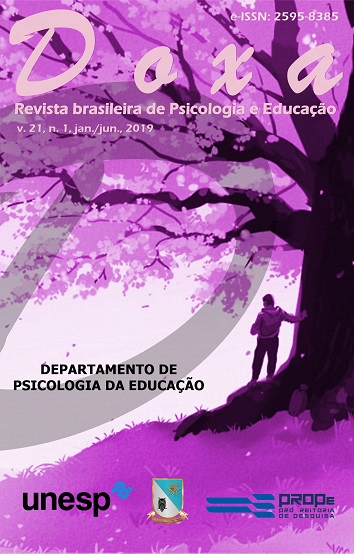Virtual fetish in the life of a brazilian hikikomori: a case report
DOI:
https://doi.org/10.30715/doxa.v21i1.12931Keywords:
Hikikomori, Social withdrawal, Fetishism, Virtual fantasies, Cyberculture, Psychoanalysis.Abstract
The hikikomori phenomenon, identified in Japan in the 1990s, is a psychosocial condition in which a person completely withdraws from society for six months or more. This problem has been increasing in several countries. The case reported in this paper is about a 38-year-old man that had withdrawn from work from more than ten years and kept isolated in his bedroom for more than five years. He used to play online games and access pornography websites in his daily routine. This case evidences the combination of factors that may have contributed to increasing the risk of social isolation: fragile narcissistic foundations, maternal oedipal fixation, difficulties to manage conflicts at scholar phase. Besides, it highlights the excessive fetishist, voyeuristic and sadomasochistic excitement with the internet.Downloads
References
ADORNO, T. W.; HORKHEIMER, M. Dialética of enlightenment: philosophical fragments San Francisco: Stanford University Press, 2002.
BIRMAN, J. Pacto perverso e biopolítica. Psicol. Clin. v. 21, n. 2, p.381-396, 2009. Disponível em: <http://www.scielo.br/scielo.php?pid=S0103-56652009000200009&script=sci_abstract&tlng=pt>. Acesso em: 26 ago. 2019.
BOMMERSBACH, T. ; MILLARD, H. No longer culture-bound : Hikikomori outside of Japan. Int J. Soc. Psychiatry, v.65, n.6, p.539-540, 2019. Disponível em: <https://journals.sagepub.com/doi/abs/10.1177/0020764019859379>. Acesso em: 26 ago. 2019.
BOWKER, J. ; BOWKER, M. H. ; SANTO, J. B. ; OJO, A. A. ; ETKIN, R. G. ; RAJA, R. Severe social withdrawal : cultural variation in past hikikomori experiences of university students in Nigeria, Singapore, and the United States. J Genet Psychol, p.1-14, 2019. Disponível em: <https://www.tandfonline.com/doi/abs/10.1080/00221325.2019.1633618?journalCode=vgnt20>. Acesso em: 26 ago. 2019.
DOMINGUES-CASTRO, M. S. ; TORRES, A. R. Hikikomori : revisão sobre um grave fenômeno de isolamento social. J. bras. Psiquiatr. v.67, n.4, p.264-272, 2018. Disponível em: <http://www.scielo.br/scielo.php?script=sci_arttext&pid=S0047-20852018000400264>. Acesso em: 26 ago. 2019.
DUFOUR, D.-R. La cité perverse: liberalisme et pornographie. Paris: Éditions Denoël, 2009.
DUFOUR, D.-R. L’indivu qui vient après le libéralisme. Paris : Éditions Denoël, 2011.
FREUD, S. Three Essays on the Theory of Sexuality. London: Hogarth Press, 1905.
FREUD, S. On narcissism: An introduction. London : Hogarth Press, 1914.
FREUD, S. Fetishism. London: Hogarth Press, 1927.
FREUD, S. Civilization and its Discontents. London: Hogarth Press, 1930.
GONDIM, F. A. A.; ARAGÃO, A. P.; HOLANDA FILHA, J. G.; MESSIAS, E. L. M. Hikikomori in Brazil: 29 years of voluntary social withdrawal. Asian Journal of Psychiatry, v.30, p.163-164, 2017. Disponível em: <https://www.ncbi.nlm.nih.gov/pubmed/29065363>. Acesso em: 26 ago 2019.
KANEKO, S. Japan's ‘socially withdrawn youths’ and time constraints in Japanese society: management and conceptualization of time in a support group for hikikomori. Time & Society. v. 15, p.233–249, 2006. Disponível em: <https://journals.sagepub.com/doi/10.1177/0961463X06067034>. Acesso em: 26 ago. 2019.
KATO, T. A. et al. (2012). Does the ‘hikikomori’ syndrome of social withdrawal exist outside Japan? A preliminary international investigation. Soc. Psychiatry Psychiatr. Epidemiol. v. 47, p.1061–1075, 2012. Disponível em: <https://www.ncbi.nlm.nih.gov/pubmed/21706238>. Acesso em: 26 ago. 2019.
KATO, T. A. ; KANBA, S. ; TEO, A. R. Hikikomori : Multidimensional understanding, assessment, and future international perspectives. Psychiatri Clin Neurosci, v.73, n. 8, p.427-440, 2019. Disponível em: <https://www.ncbi.nlm.nih.gov/pubmed/31148350>. Acesso em: 26 ago. 2019.
LEBRUN, J-P. La perversion ordinaire: vivre ensemble sans autri. Paris, Denoël, 2007.
LI, T. M. H.; WONG, P. W. C. Youth social withdrawal behavior (hikikomori): A systematic review of qualitative and quantitative studies. Australian and New Zealand Journal of Psychiatry, v. 49, p.595–609, 2015. Disponível em: <https://www.ncbi.nlm.nih.gov/pubmed/25861794>. Acesso em: 26 ago. 2019.
O NAUFRAGO. CAST Direção: Robert Zemeckis. 2000. Título original: Cast Away.
PRIOSTE, C. O adolescente e a internet: laços e embaraços no mundo virtual. São Paulo: edusp, 2016.
SAITO, T. Shakaiteki Hikikomori: Owaranai Shishunki (Social Withdrawal: A Neverending Adolescence). Tokyo: PHP Shinsho, 1998.
SAKAMOTO N.; MARTIN R.G.; KUMANO H.; AL-ADAWI S. Hikikomori, is it a culture-reactive or culture-bound syndrome? Nidotherapy and a clinical vignette from Oman. International Journal of Psychiatry in Medicine, v. 35, p.191–198, 2005. Disponível em: <https://www.ncbi.nlm.nih.gov/pubmed/16240975>. Acesso em: 26 ago. 2019.
SUWA M.; SUZUKI K. Psychopathological features of “primary social withdrawal”. Seishin Shinkeigaku Zasshi. v. 104, p.1228–1241, 2002. Disponível em: <https://www.ncbi.nlm.nih.gov/pubmed/12649893>. Acesso em: 26 ago. 2019.
TEO, A. R.; GAW, A. C. Hikikomori, a Japanese culture-bound syndrome of social withdrawal? A proposal for DSM-5. Journal of Nervous and Mental Disease, v. 198, p.444–449, 2010. Disponível em: <https://www.ncbi.nlm.nih.gov/pubmed/20531124>. Acesso em: 26 ago. 2019.
TOIVONEN, T.; NORASAKKUNKIT, V.; UCHIDA, Y. Unable to conform, unwilling to rebel? Youth, culture, and motivation in globalizing Japan. Frontiers in Psychology, v. 2, p.207, 2011. Disponível em: <https://www.ncbi.nlm.nih.gov/pmc/articles/PMC3171786/>. Acesso em: 26 ago. 2019.
TÜRCKE, C. Sociedade excitada. Campinas, SP: Editora Unicamp, 2010.











